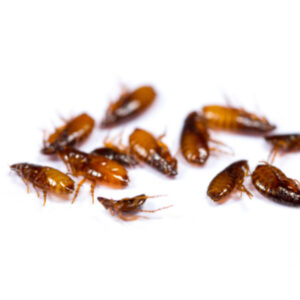Fleas aren’t just a problem in the spring and summer. A flea infestation in the fall and winter is common and very difficult to get rid of. Fall flea control is all about prevention. We’ve put together a few of the top fall flea control tips to help keep your holiday season flea-free.
Can Fleas Survive the Cold of Winter?

No, fleas can’t survive temperatures below 48 degrees Fahrenheit. However, fleas know this and spend the months of fall searching for a warm place (or body) to overwinter. These opportunistic high-hoppers are very active in the fall, searching. When they find a host or a house, they settle in to avoid the cold.
These persistent pests don’t let go of a host very easily. Once on a host, fleas drink blood and lay eggs. They can lay up to 50 eggs a day over the course of three months. These eggs don’t all hang onto the host though, many fall off into the carpet, rug, couch or bed.
Can My Pets or I Get Sick From a Flea Bite?
Yes, both you and your pet can get sick from a flea bite. In fact, fleas can carry a lot of very dangerous diseases that they transmit through their bite or even their feces. In the 14th century, fleas were responsible for killing over half of Europe when they unleashed the bubonic plague. Now, it’s not very likely that a flea will be carrying the plague here in the Carolinas, though it still does occur in other parts of the world. There are plenty of other reasons to fear the flea.
Murine Typhus
One disease that was once eradicated in the United States is making a comeback thanks to the flea. Murine typhus is a nasty disease that’s spread through contact with infected fleas. Right now, it’s mostly found in the southwest. California and Texas are the two states that have been hit hardest.
Mycoplasma haemofelis
Mycoplasma haemofelis is a potentially dangerous disease that affects cats and, sometimes, humans. This parasitic bacteria gets transmitted through the bite of an infected flea. The disease depletes the cat of all energy. This anemia can get so extreme that it has been known to cause death. In rare cases, Mycoplasma haemofelis has even been transmitted to people.
Cat Scratch Disease
This nasty disease is caused by a bacteria called Bartonella henselae and is both carried and transmitted by fleas. Over 40% of cats have been infected with this common disease at some point in their lives. From there, it can be easily transmitted to humans through a bite or a scratch from your feline friend. While symptoms in cats are usually very mild, that isn’t always the case for humans. People have been known to have hallucinations and even go blind from cat scratch disease.
Tapeworms

Finally, the dreaded tapeworm. This nasty parasite makes itself at home in a body, usually in the intestines (or brain). The worst part about tapeworms is that they can live in a host for a long time, causing only mild symptoms. In that time, they can grow very long. In fact, the longest ever recorded was 28 feet long. Tapeworms are spread by ingesting, accidentally or otherwise, an infected flea. Don’t worry though, they are very easily treated.
How Can I Prevent a Flea Infestation This Winter?
The good news is there is that, with flea control, you can reduce the likelihood of ever running into a nasty flea. Here are just a few fall flea prevention tips to help prevent a flea infestation for the holidays.
Outdoor Flea Prevention:
- Get rid of any piles of lawn debris, including leaves, twigs, and sticks.
- Keep mowing your grass until it stops growing, fleas love to play in the long grass.
- Clear out tall grass and brush around the perimeter of your property to make a flea-free buffer zone around your yard.
- Trim your shrubs and tree branches away from your home to keep the fleas from seeking shelter their.
- Keep flea-infested rodents, like raccoons and possums, out of your yard by properly storing your garbage in a sealed container.
Indoor Flea Prevention:
- Using a flea comb, check your pets on a regular basis for fleas.
- Pay attention to where your pets frequently spend time in your home and regularly clean and vacuum those spots.
- Wash your pet beds, toys and anything else they use on a regular basis.
Invest in Professional Flea Control
These fall flea prevention tips will help you reduce the likelihood of having a flea infestation for the holidays. If you want even more protection, then trust the professionals at Cramer Pest Control. Our outdoor pest control targets fleas, and mosquitoes while our residential pest control takes care of even more, inside.
To get started, give us a call at (704) 763-0204 or request an inspection here. For the best tips and tricks from the pros, head over to our blog. Follow us on Facebook for the latest news and deals from us here at Cramer.
Fall Flea Control Tips to Prevent a Flea Infestation This Winter in North Carolina and South Carolina
Protecting North Carolina and South Carolina
